How to Find Blog Topic Ideas (With Tools and Examples)

There are a lot of blogs out there dedicated to the art of blogging, and many of them write helpful guides on how to perform various tasks - tasks such as, for example, topic ideation. When you search for this topic, what do you find?
Tools. Lists of software, all of which are designed to generate topic ideas for you. Click a button, type in a search term, get a list of new blog ideas hundreds or thousands deep.
The trouble is, most of these work the same way. They plug that keyword into Google with variations and add letters to trigger different autocomplete queries, use the Google keyword planner to find ad keywords, or take an existing list of topic templates and shoehorn the keyword into them.

In my experience, 50% or more of the topic ideas they give you are nonsense. You'll get things like "Top Ten Ways Content Marketing Can Help You Learn to Fish" or something. I mean, sure, maybe you could spin that into a relevant idea somehow, but it's not likely to be a top-tier traffic generator.
Blindly using tools tends to produce sub-par results. That's why I decided to write this post: to give you an idea of my process and maybe a couple of tools I use to facilitate it.
The key here is the process, not just a list of tools to use.
Let's get started.
Step 1: Generate Blog Post Ideas
The first part of the process is to generate as many basic blog post ideas as possible. This step is where all those tools come in. By developing a massive list of possible topics, you can review each one and pick winners of the bunch.
That's what the majority of this post will be about, but without some primary data to start with, you have nowhere to begin.
If you want to generate ideas manually, I recommend looking into communities where your audience is talking. Reddit subs, Quora, Facebook Groups, LinkedIn Groups, Twitter; these are all places where conversations happen. Those conversations are about something, which means there's an unfilled niche for information.
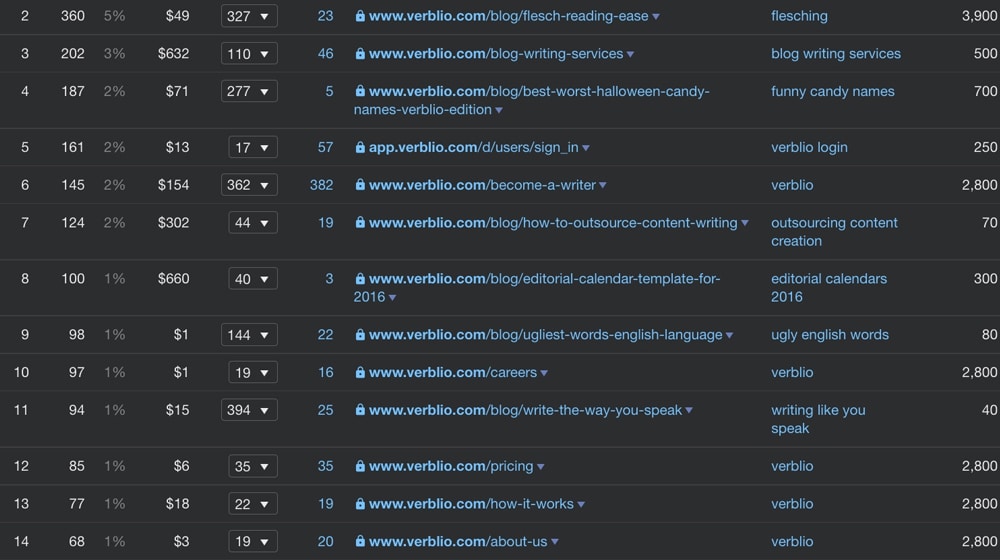
If you choose to use tools, you have plenty of options, of course.
- Ahrefs (my favorite)
- Google Search
- Google Autocomplete
- Google Trends
- Ubersuggest
- Semrush
- Buzzsumo
- Amazon
- Answer The Public
- Tweets and hashtags
- Influencers
- Podcasts
At least for this first step, the point with these tools is to list as many potential topic ideas as possible. As you'll see later, filtering them is a large part of the topic ideation project.
Step 2: Evaluate Blog Topics
This step is where the bulk of your work will be.
First, go through your blog topic list and remove anything that's nonsense or too generic to be helpful. Suppose you put in "content marketing" and get a "guide to content marketing" well, yeah. That's an obvious keyword, and it's far too generic for virtually anyone to rank producing content for it, so you can safely remove it from the list.
Next, it's time to do some research and see what the environment around your blog topic idea looks like.
1. Check on traffic.
You can find organic traffic estimates using tools like Ahrefs and Semrush. These metrics will show you the content that already exists for the topic and estimate the monthly traffic those pieces of blog content can realistically attract.
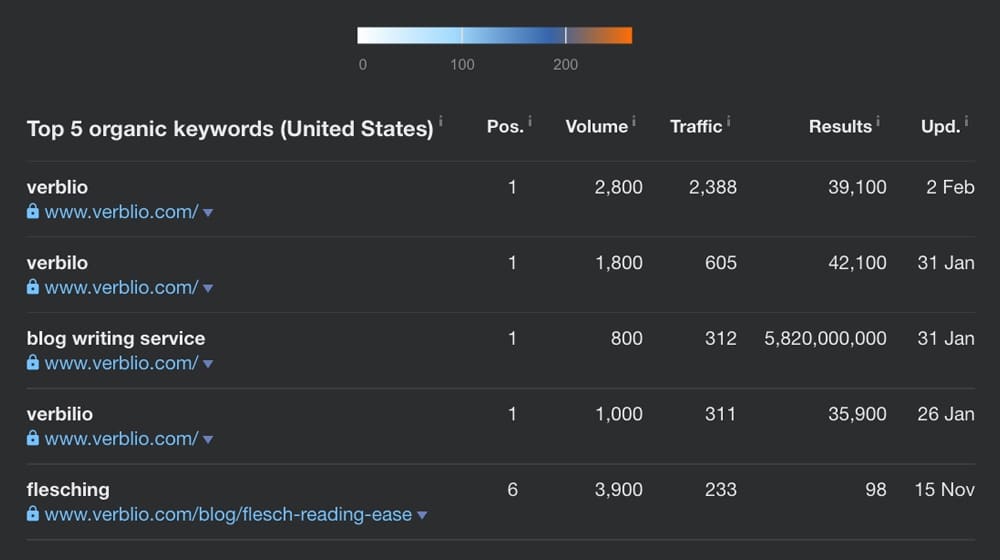
Traffic estimates can also show you which topics are nice-looking but get poor search volume and which ones might look mediocre but have a lot of traffic behind them. You can also identify key topics that pull in most of the traffic for a competitor.
2. Check for competition.
Using the same tools and simple Google and search engine searches, and other relevant digital marketing tools, you can estimate competition for the keyword and topic.
- How long are the other pieces of content covering the same topic? Will you be able to outdo them, or will it be a struggle? Are they producing quality content, or is it mostly fluffy?
- How old is the other content out there? Older content tends to be more entrenched and harder to supplant, primarily because of accumulated backlinks, but it might also be out of date, which is an opportunity for you.
- What kind of engagement does it have? Does it have a lot of social media shares? Does it have many blog comments, and are they good or spammy?
- How optimized is it? Does it have blog images, and do they have good alt text? Does it use keywords appropriately? Is it formatted nicely?
- Is it a popular topic? Are you the first person to write about this? Are there dozens of similar articles or hundreds?
All of this aims to give you an overall impression of the content to answer a single question: can you compete and rank for the keyword, or is it a fool's errand to try?
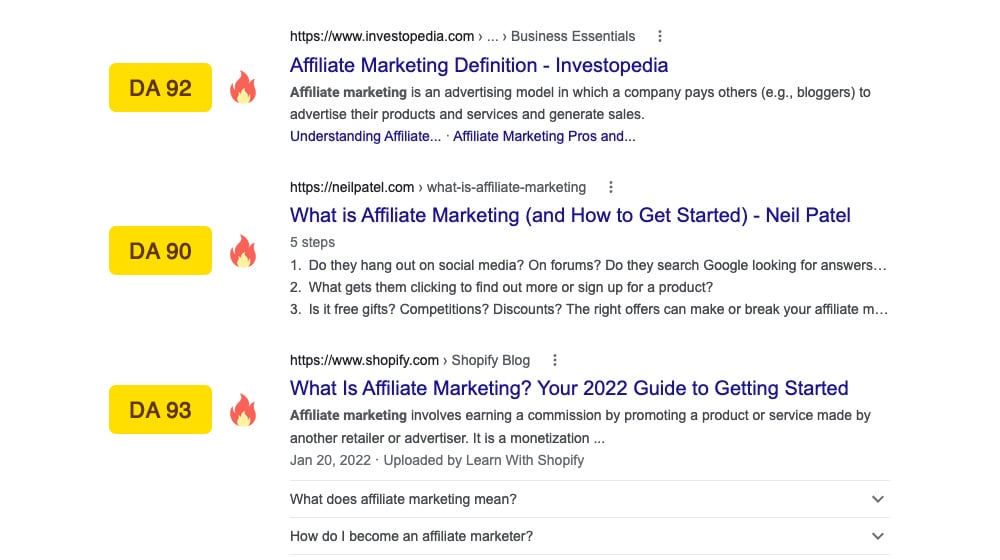
Remember that sometimes it can be worth producing new content to have something published for a popular keyword, even if you don't rank, because not covering the blog topic seems like a strange gap.
3. Check for demand.
Some topics have existing demand for a particular kind of content. For example, a keyword directly relates to a customer's pain point is begging for a solution. The people searching for that topic have a specific idea in mind of what they want to find, and if you can provide it to them, you immediately reap the benefits.
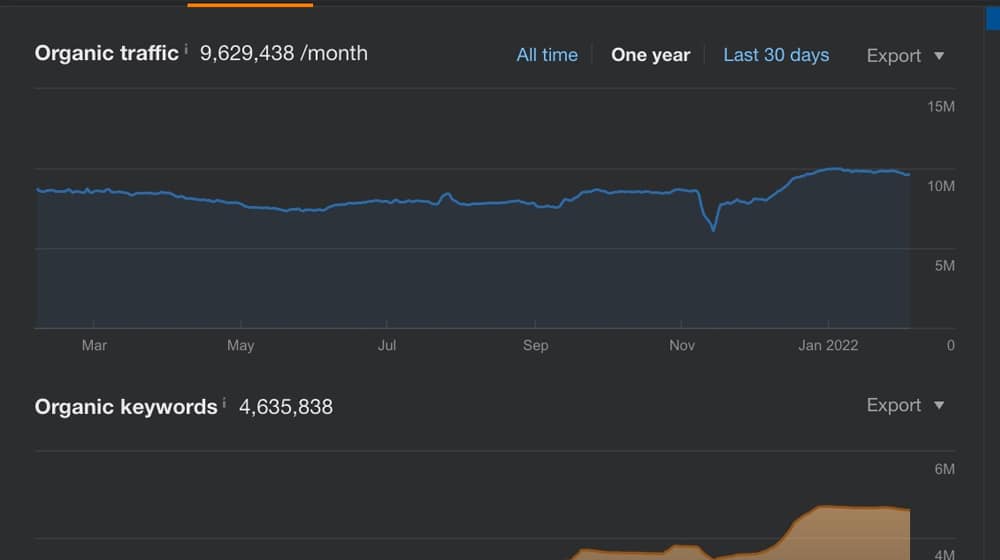
This process is valuable if you find demand relevant to your business product or service. The best-case scenario is one where you can directly address a pain point, give DIY instructions for solving it, and include a call to action to let people skip the hassle by paying for your product.
Step 3: Develop Angles
Once you have a new topic you think might be a winner, it's time to figure out what you want to write. After all, there's more to it than just picking a keyword and handing it over to a writer.
Generally, there are three major decisions you need to make, each of which has a defined impact on the blog content you produce.
1. Determine the buyer persona.
The first is to figure out who your audience is. Different audience attributes will affect the way you produce content.

Consider factors like:
- Are you aiming more towards men or women? Younger or older? This approach can affect your writing style, the kinds of references you make, and even what other sites you choose to link to.
- Experience level. Are you writing a beginner's guide for novices or an advanced guide for experts? You don't want to be explaining how the internet works to an audience of IT professionals.
- Is this B2B or B2C? Talking about consumer-grade options isn't going to help if your audience is primarily business-class. Conversely, recommending a business-level service to solve a problem doesn't support an individual looking for assistance in their living room.
- Expected budget. The customer's budget is similar to the context problem. If you're talking to people with consumer or small business budgets, recommending enterprise software or service won't do well. Conversely, a business with a big budget most likely won't want to cobble something together out of free tools and DIY solutions.
All of this combines to help you figure out a target audience for your post. Some of it will be determined by your business and service (for example, if you're B2B or B2C), while others can change from post to post. In some cases, you can even take the same topic and write 2-3 posts from different perspectives and with different goals.
2. Determine the keyword intent.
This one goes hand in hand with the buyer persona. Some keywords have a specific buyer intent behind them. Others might be generic enough that you can leverage several different buyer intents, either into the same post or into various posts with keyword variations. User intent is so important I wrote a whole post about it here. To summarize, there are several kinds of search intent, all stemming from why a user is searching for a keyword.

They are:
- A keyword like "Netflix" is likely a user intending to go to Netflix.com, not necessarily learn about Netflix from other venues. These are often not valuable keywords to target.
- The user wants to learn something about their keyword, so they want to find an authoritative, trustworthy source that wrote about it. There's no further intent but to satisfy curiosity or learn more about a topic, but you can sometimes leverage it into a more profound interest.
- The user wants instructions on how to complete a task. These are great because it's usually a customer pain point, making it an excellent choice to target.
- Commercial and Transactional. These are the people actively out looking to buy something, or at the very least do research into a product with buyer intent. These are the best to capture people who might be interested in buying your stuff.
You can see how (combined with the previous item) you can take one keyword and spin it off into many different pieces of content. Generally, those pieces of content are residing at various places in the sales funnel, too. One post focusing on informational queries pulls in many broadly interested people. A second one pulls in part of that audience more focused on learning deeper information about the topic, and a third convinces them to buy your relevant product.
3. Determine the content type.
Your choice partially informs the third consideration you make of the first two items, but it is somewhat independent. That is, the type of content you produce. Is it an informative post? A listicle? Linkbait? Evergreen content?
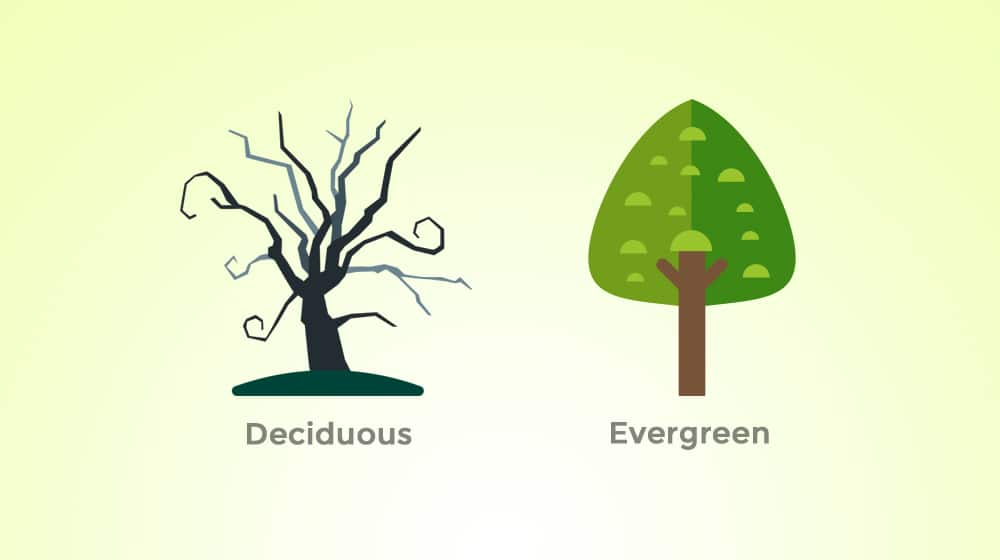
I produced a rundown of the various types of content over here. Among these, a few stand out as the most important types of content: evergreen informational content, link bait, list format content, and skyscraper content.
In broad strokes, whenever you're reaching top-of-funnel readers with low purchase intent, you're going to want to aim more informational in your format with more evergreen styles of blog content. Linkbait, list posts, and skyscraper content all work well here.
Then, you can do more evergreen and link bait formats with tutorials and deeper informational content for mid-funnel people who are performing in-depth research. Your goal is to hook readers and convince them you know what you're talking about beyond the surface level.
For the people at the bottom of the funnel, the ones most likely to be converting, your new content shifts more transactional and commercial. You're directly addressing pain points, often more narrowly than your top of funnel topics, and you lace the content more heavily with purchase CTAs.
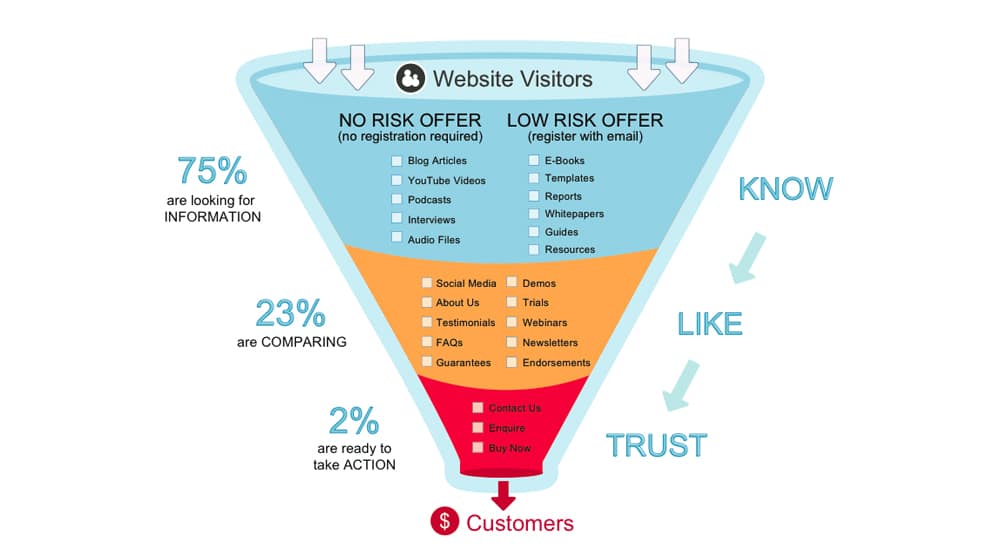
Again, all of this stems from a single keyword and topic. One keyword, generated by one of those tools listed up top, can spin off into half a dozen or more pieces of distinct, non-cannibalistic content on your site.
Of course, this is all the groundwork. Once you've nailed down your audience, your intent, and your keyword, that's where the real fun begins. It's time to add that topic to your editorial calendar and produce a great article that takes all of those factors into account.
What Do You Do?
My favorite way to brainstorm new blog post ideas is by searching Google, looking at what's working for competitors, customer pain points, and Google autocomplete. I then pass over it manually to pick out the most promising topics and research them using Ahrefs, which is by far my current favorite keyword research tool on the market. I do my initial research with an SEO tool like Ahrefs, then make my persona/content/format decisions, and use all of that information to develop a title, which I then either write myself or (in the case of my clients) give that topic to my writers to produce. The result is excellent content, well-targeted to an available audience, and engineered to convert.
I'm curious what other business bloggers have to say. What do you do to generate content ideas for your site? What are your favorite tools? Is there a step in your content strategy that I don't use but maybe should? Let me know all about it in the comments.










March 17, 2022
It's been difficult for me to think of topics to write about recently so this is a great help. Thanks.
March 25, 2022
Thanks Amar! Love to hear it.
April 18, 2022
This is a big help! Thanks a lot.
April 29, 2022
Thanks Aimee! Love to hear it.
July 21, 2022
I very much needed this. I just sometimes feel like I've run out of ideas.
July 22, 2022
Hey Ned! Happy to help out.
Some weeks are better than others; you'll find a treasure trove of topics, and then you'll go weeks without finding any good ones.
Building a content calendar and planning in advance saves so much time.